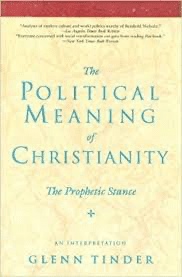The Political Meaning of Christianity: Chapter Two: Prophetic Hope: Community and Society and The Ideal of the Just Society: pp. 53-68
In the part of Chapter Two entitled “Community and Society” Tinder pushes a distinction, if not a conflict, between “community” and “society.” Community, he argues, is compatible with the exalted individual while society is not. Societies are necessary because of our fallenness, but they debase individuals. Community enhances individual dignity. He also argues or clarifies that his exalted individual ideal is not the same as individualism.
Here is the key paragraph of this chapter part: “The political meaning of Christianity, then, does not lie in the ideal of a Christian society, for no such society can exist. Christianity calls for agape and agape for community—the unity of individuals in their exaltation. Society is the unity of human beings in subjection to one another and to the worldly necessities underlying custom, law, and governance. The terms Christian and society cannot logically be joined.” (61)
In the next section, “The Ideal of the Just Society,” Tinder argues that a perfectly just society is not a feasible human project. The key paragraph is: “It seems that the phrase ‘just society,’ as common and apparently unchallengeable as it is, does not represent a coherent and practicable ideal. The term just comprises discordant standards or else comes into conflict with different, but no less compelling, standards; the term society designates a source of practical necessities incompatible with justice. Christianity leads to this conclusion by affirming the simultaneous exaltation and fallenness of every individual. Our self-contradictory nature gives rise to conflicting imperatives.” (63)
According to Tinder, the political meaning of Christianity is not an answer to how to create the ideal society but how to hold ourselves available for community in the midst of society. (68)
Clearly, Tinder is a pessimist. Or perhaps better labeled a realist. His account of Christian social ethics is similar to, if not identical with, that of Reinhold Niebuhr who was a notorious pessimist (or realist). I might argue that a society can approximate community—at least to a greater extent than either Tinder or Niebuhr thought. Paul Tillich talked about a “theonomous society” as one that is open to the depths of human potential and to the transcendent ground of that potential. What would that look like? Has it ever existed in history or is it a purely eschatological ideal? I don’t know, but I think it’s worth striving for. Niebuhr talked about the “relevance of an impossible ideal” and perhaps Tinder would say the impossible ideal is, for him, true community, not the perfectly just society. But isn’t his rejection of a perfectly just society dependent on the meaning of “just?” I think so. He regards justice as fraught with conflicts between standards such as rehabilitation and retribution. But what if rehabilitation (of criminals) could replace retribution? There are places on earth where that is regarded as a real possibility and where the penal systems do adhere to it as that.
In any case, it seems to me that a just society is an ideal not to be dismissed. So is a Christian society as one where Christianity is the “glue” that holds things and people together. Just because that has never happened in history does not mean it cannot ever happen in history. I would admit, however, that a society organized according to agape love (a la Rauschenbusch) is impossible within human history. So much depends on the meanings of words and concepts. Overall I agree with Tinder more than I disagree.
*Note: If you choose to comment, make sure you read the relevant passages of the book. If not, you may ask a question or questions. In any case, make sure your comment or question is less than 100 words, on topic, addressed to me, civil and respectful, not hostile or argumentative, and devoid of pictures or links.*














